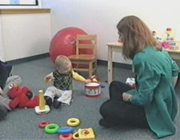
Introduction
The diagnosis of autism centers around three problem areas. Overall, patients with autism have delays or problems in social interactions, communication/language and repetitive interests/behavior. In this section you will find a series of video examples from the First Signs organization that demonstrates the some major symptoms and signs of autism. First Steps is a leading organization promoting the early identification and intervention of autism. The video for this first section demonstrates problems in social reciprocosity.
(For additional clips see the ASD Video Glossary.)
There are several warning signs of a developmental delay or problem that may be an ASD. Many of these indicators are observable by a physician in a visit during a routine well-child check up and some may be reported by parents. The regression or loss of a skill in any area always warrants a more extensive evaluation.
Basic milestones to keep in mind:
- By six months, a child should be smiling or expressing happiness
- By nine months, a child should be reciprocating smiles, sounds, and facial expressions
- By 12 months, a child should be babbling, pointing, or gesturing
- By 16 months, a child should be speaking in single words
- By 24 months, a child should be using two-word phrases
Questions for different health checks include:
At 4 Months:
- Follow and react to bright colors, movement, and objects?
- Turn toward sounds?
- Show interest in watching people’s faces?
- Smile back when you smile?
At 6 Months:
- Relate to you with real joy?
- Smile often while playing with you?
- Coo or babble when happy?
- Cry when unhappy?
At 9 Months:
- Smile and laugh while looking at you?
- Exchange back-and-forth smiles, loving faces, and other expressions with you?
- Exchange back-and-forth sounds with you?
- Exchange back-and-forth gestures with you, such as giving, taking, and reaching?
At 12 Months:
- Use a few gestures, one after another, to get needs met, like giving, showing, reaching, waving, and pointing?
- Play peek-a-boo, patty cake, or other social games?
- Make sounds, like “ma,” “ba,” “na,” “da,” and “ga?”
- Turn to the person speaking when his/her name is called?
At 15 Months:
- Exchange with you many back-and-forth smiles, sounds, and gestures in a row?
- Use pointing or other “showing” gestures to draw attention to something of interest?
- Use different sounds to get needs met and draw attention to something of interest?
- Use and understand at least three words, such as “mama,” “dada,” “bottle,” or bye-bye?
At 18 Months:
- Use lots of gestures with words to get needs met, like pointing or taking you by the hand and saying, “want juice” ?
- Use at least four different consonants in babbling or words, such as m, n, p, b, t, and d?
- Use and understand at least 10 words?
- Show that he or she knows the names of familiar people or body parts by pointing to or looking at them when they are named?
- Do simple pretend play, like feeding a doll or stuffed animal, and attracting your attention by looking up at you?
At 24 Months:
- Do pretend play with you with more than one action, like feeding the doll and then putting the doll to sleep?
- Use and understand at least 50 words?
- Use at least two words together (without imitating or repeating) and in a way that makes sense, like “want juice” ?
- Enjoy being next to children of the same age and show interest in playing with them, perhaps giving a toy to another child?
- Look for familiar objects out of sight when asked?
At 36 Months:
- Enjoy pretending to play different characters with you or talking for dolls or action figures?
- Enjoy playing with children of the same age, perhaps showing and telling another child about a favorite toy?
- Use thoughts and actions together in speech and in play in a way that makes sense, like “sleepy, go take nap” and “baby hungry, feed bottle” ?
- Answer “what,” “where,” and “who” questions easily?
- Talk about interests and feelings about the past and the future?
First Signs
 |
| Autism can be identified as early as 18 months. |
